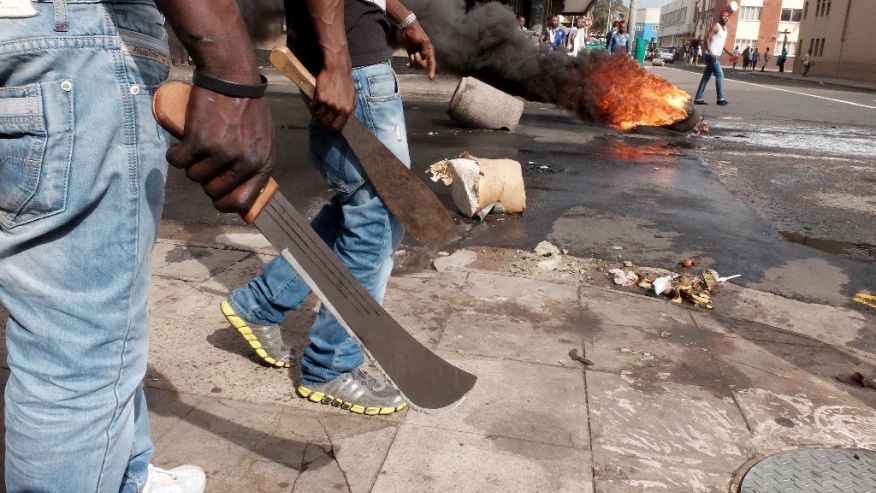News:
For the past several weeks, media have been reporting shocking news of xenophobic attacks in South Africa. Several people were killed and 5,000 left homeless since the attacks erupted several weeks ago against other Africans and Asians. The Government of South Africa deployed its army to volatile areas to prevent attacks on foreigners. More than 10,000 people took into the streets of Durban to protest against the violence. Local media reports said the attack started after Zulu King Goodwill Zwelethini said in one of the recent gatherings that the foreigners ‘should pack their bags and go’ because they are taking jobs from the citizens. In his response, President Jacob Zuma said his Government is addressing the social and economic concerns.
Comment:
This is not the first time that xenophobic violence is witnessed in a country portraying itself as a diverse rainbow-nation. The term coined by Archbishop Desmond Tutu and elaborated by Nelson Mandela was intended to encapsulate the unity of multi-cultures and the coming together of many different nations in a country that was in a strict division of white and black. This is the latest in a series of attacks that dates back years. In 2008, Johannesburg was the epicenter of more anti–immigrant tensions that left dozens dead in similar attacks that spread to Cape Town. Most of the victims were Zimbabweans. In those attacks more than 200 people were arrested on various charges including murder, robbery and looting.
It is not a surprise to see a country that adopts a Capitalist economic system plunging into such violence as a result to its bounding into corrupt economic policies which does not focus on the distribution of the wealth to the common man but only to the few elites. Sadly, despite the country’s abundance of minerals and resources such as diamonds and gold, over 12 million people are languishing in poverty. This is an indication that the explosion of violence is to send a message not only to the Secular Government which has failed in taking care of the affairs of its citizens, but to the whole imperial capitalist system that has ruined the lives of South Africans.
As for the violence to take a stream of attacking the ‘foreigners’, this problem is not only found in South Africa but in the whole world including the super power. In August of last year, a white Ferguson Police officer shot dead Michael Brown, an 18-year-old black young man, an incident that erupted in protests in Fergusson and New York.
It is worth to ponder how this problem has become a malignancy in South Africa. Scrutiny shows that the seeds of xenophobia were first sowed during the apartheid era enforced by Dutch and the British settlers through legislation of a National Party formed in 1915. As a governing party in 1948, the NP members reintroduced their evil racism policy and as result, black South Africans were alienated and marginalized in all spheres of life. This situation gave rise to the formation of several ‘revolutionary’ movements led by Nelson Mandela, portrayed as hero, who also led the anti-apartheid campaign and eventually became President in 1994. Worse still, 21 years of the ‘Independence and Freedom’, South Africa saw itself suffering the same problem that has now taken a new twist of Xenophobia… The reason being the post-colonial ruling class was only but agents of the colonial masters carrying the same poisonous policies of discriminations and segregation.
It is crucial to comprehend that patriotism, nationalism and tribalism are all backward shallow ideas that cannot bind people together and make them a strong nation. These divisive and segregated ideas make people identify themselves on a nationalistic basis where some consider themselves more superior than the other thus making them prone to tribal and regional clashes. Even within a country, tribal clashes can emerge in the struggle for power among the tribes. It is worth mentioning that the West through their agents creates chaos between one country against the other or between a tribe against the other as a means to continue their political and economic colonialism in Africa.
On its part, Islam has long declared a war on these fatal diseases. In Arabian Peninsula, which was highly dominated by these rotten ties, therefore tribal rivalries and wars over trivial issues were witnessed. Islam commanded loyalty to the Islamic creed inviting all people to believe in the Almighty Allah Creator of all mankind. Ties in Islam were therefore based on the Aqeedah of Laa ilaha Ila Allah and not on race, color or region. This creed is the one that South Africa and the entire world need to take as a basis of their ties. The creed that commands loyalty to the Deen rather than region, race and tribe.
يَا أَيُّهَا النَّاسُ إِنَّا خَلَقْنَاكُم مِّن ذَكَرٍ وَأُنثَى وَجَعَلْنَاكُمْ شُعُوبًا وَقَبَائِلَ لِتَعَارَفُوا إِنَّ أَكْرَمَكُمْ عِندَ اللَّهِ أَتْقَاكُمْ إِنَّ اللَّهَ عَلِيمٌ خَبِيرٌ
“O mankind, indeed we have created you from male and female and made you peoples and tribes that you may know one another. Indeed, the most noble of you in the sight of Allah is the most righteous of you. Indeed, Allah is Knowing and Acquainted.”
(Al-Hujraat, 49:13)
Written for the Central Media Office of Hizb ut Tahrir by
Shabani Mwalimu
Media Representative of Hizb ut Tahrir in East Africa

